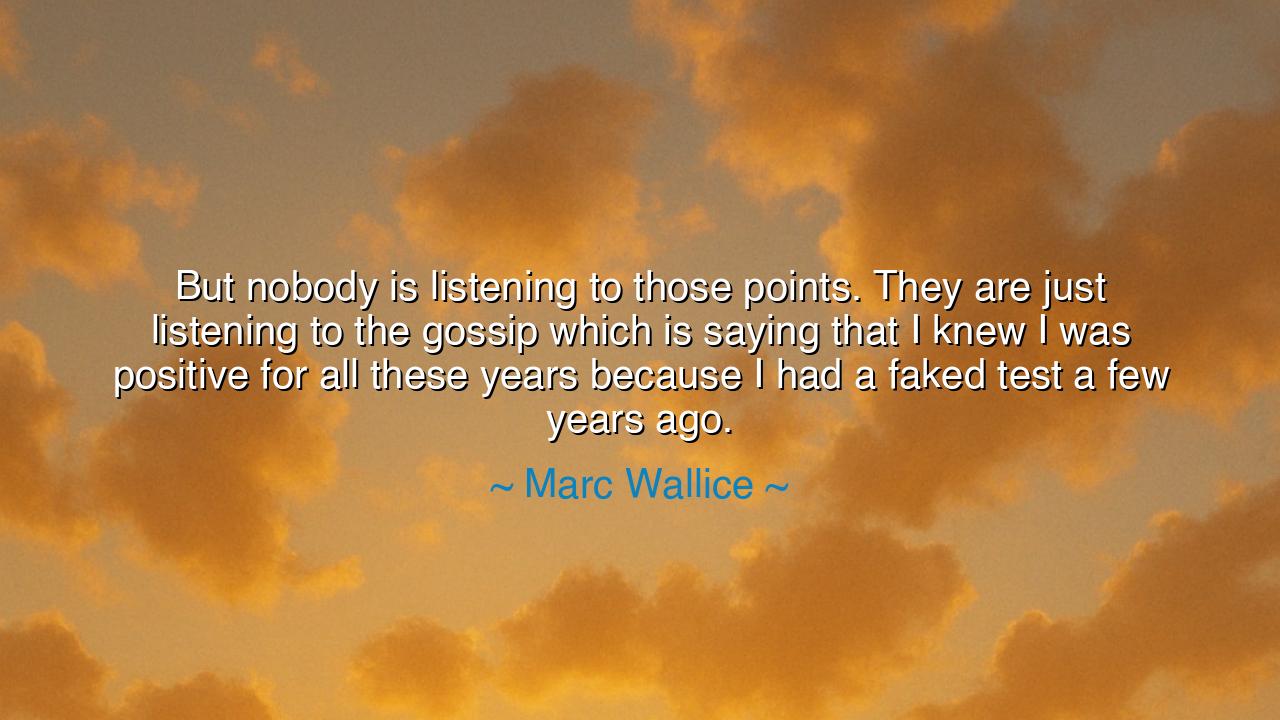
But nobody is listening to those points. They are just listening
But nobody is listening to those points. They are just listening to the gossip which is saying that I knew I was positive for all these years because I had a faked test a few years ago.






The words of Marc Wallice—“But nobody is listening to those points. They are just listening to the gossip which is saying that I knew I was positive for all these years because I had a faked test a few years ago.”—reveal the sorrow of a man caught between truth and rumor, between explanation and accusation. His cry is not only his own, but echoes the plight of countless souls across history who have been judged not by reason, but by whispers. In this lament, we hear the ancient struggle between truth and falsehood, between the voice of fact and the roar of gossip.
The ancients long warned of the destructive power of rumor. The Roman poet Virgil, in his Aeneid, described Rumor as a winged monster, swift of foot and terrible, spreading lies and half-truths faster than truth could catch them. Once unleashed, gossip becomes a force that no argument, no proof, can easily overcome. Wallice’s words place him in this same battle—his points, his explanations, are drowned by the louder, easier story of scandal. For men and women, often, prefer the taste of gossip to the discipline of truth.
History gives us many examples of this tragic pattern. Consider Joan of Arc, accused of heresy and witchcraft, condemned not by divine truth but by political rumor and slander. Her words of faith and purity were disregarded; what spread was the narrative her enemies needed to silence her. Only centuries later was her name cleared. So too with Socrates, condemned by the Athenians not for proven crimes but because slander whispered that he corrupted the youth and dishonored the gods. In both cases, the people chose gossip over the careful listening to truth.
Wallice’s lament also reminds us of the frailty of reputation. A lifetime of deeds may be overturned by a single accusation, true or false. For scandal, once spoken, carries an energy that is hard to restrain. This is why wisdom counsels us to guard our tongues and ears alike: for to speak or repeat gossip is to wield a weapon that can wound deeply, often beyond repair. The truth may eventually rise, but not before lives are broken in the storm of lies.
Yet from this tragedy comes a lesson of strength. The one who suffers slander must, though wounded, cling to inner integrity. Others may not listen, but one’s own conscience remains the final judge. Though gossip may obscure the truth for a season, truth itself is eternal. Time has a way of unveiling what lies hidden, and history often redeems those unjustly condemned. To endure such trials with dignity is itself a form of heroism, for it resists bitterness and holds fast to what is real.
For us, the teaching is clear: resist the temptation to believe gossip without discernment. Ask first for evidence, listen for reason, and honor the humanity of those who are accused. Be the one who listens to the points, not merely the whispers. In your own life, when falsehoods rise against you, remember that your worth does not vanish with the tongues of others. Continue to walk in truth, for though slander wounds quickly, truth heals slowly but surely.
So, dear listener, take Wallice’s cry as a warning and a charge. Guard your speech, for words are arrows once loosed, never returning. Guard your ears, for what you hear may not be what is true. And if you find yourself, like him, facing the weight of false rumor, hold firm to your conscience and endure, knowing that truth, though buried, cannot die. In the end, let your life itself, steady and faithful, be the proof stronger than gossip. For scandal may fill the moment, but truth endures the ages.






HTHuynh Thi
This quote prompts reflection on the emotional toll of being misrepresented. How does repeated exposure to false accusations or gossip affect mental health and self-perception? I’m curious whether public figures or ordinary individuals experience similar challenges in controlling narratives about themselves. It also raises questions about forgiveness, perception management, and the long-term consequences of allowing gossip to dominate discourse.
KLPham khanh ly
I’m intrigued by the frustration expressed in this quote and the broader implications for credibility. Does this reflect a societal preference for drama over nuance, and how does that affect personal and professional life? I also question how one can effectively communicate complex truths in an environment dominated by sensationalism. Are there ways to engage audiences so they focus on the facts instead of the gossip?
DNDang Ngo
This statement highlights the difficulty of combating narrative bias. Even when someone presents evidence to clarify a situation, why are audiences often more drawn to rumors or simplified versions of events? I wonder how this tendency impacts justice, fairness, and personal relationships. Could the prevalence of gossip over fact contribute to broader issues of public perception and misinformation in society?
KRke rac
Reading this, I feel concerned about the social dynamics at play. Why do people often prioritize scandalous or sensational stories over factual clarifications? Could this selective attention create long-lasting reputational damage, even when the person provides evidence or reasoning? I’m curious about strategies for addressing misinformation and how individuals can regain trust when the public largely focuses on gossip.
QNQue nguyen
I find this quote troubling because it reflects how gossip can overshadow factual explanations. It makes me wonder about the psychological impact on someone whose credibility is undermined by rumors. How do public figures navigate situations where truth is ignored in favor of sensationalism? It also raises questions about accountability and the responsibility of media and audiences to seek verified information rather than spreading hearsay.